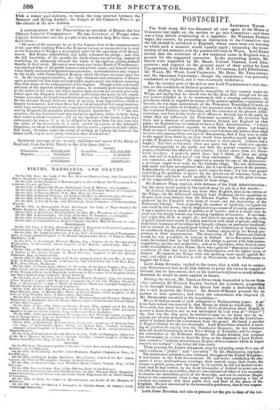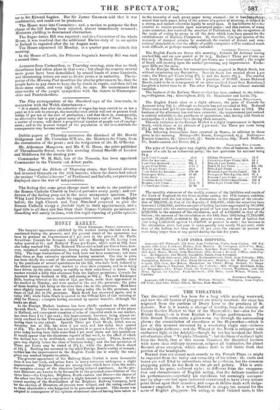POSTSCRIPT.
SATURDAY NIGHT.
The Irish Arms Bill was discussed all over again in the House of Commons last night, on the motion to go into Committee ; and there was a long debate terminating in a squabble. Sir Wustirron BARRON began the contest, by proposing an instruction to the Committee that the bill should be extended to England, where cases were not wanting to which such a measure would equally apply ; instancing the insur- rection of last summer, and the present toll-riots in Wales. Lord ELIOT denied that the existence of a few insulated cases in England was a ground for the suggested extension. In the succeeding debate, Mi- nisters were supported by Mr. SHAW, Colonel VERNER, Lord Dux- GANNON ; and opposed on the general score of their policy by Lord PALMERSTON, Lord SEYMOUR, Mr. M. J. O'CONNELL, Lord EBRINOTON, Mr. WARD, Mr. WYSE, Lord CLEMENTS, Mr. Ross, Mr. TRELAWNEY, and Mr. SHARMAN CRAWFORD ; though the amendment was generally condemned or slighted, and it was eventually withdrawn. ,
But the notable part of the debate was Lord PALMERSTON'S oral trea- tise on the condition-of-Ireland question— After alluding to the comparative tranquillity of that country under the Whigs, and saying that be should vote for the Arms Bill, though not for the new powers included in it, Le enumerated, with a running commentary, the grievances which he regarded as causes of the present aOtation —ejectment of tenants, the too large endowments of the Protestant Established Church, (a grievance not pcculiar to Catholics) the depressed state of the Catholic clergy, the restricted Parliamentary franchise, and the existence of the present Admi- nistration, not from dislike to the chief officers in Ireland, but to the party by whom they are influenced, the Protestant ascendancy. He admitted that there was a disunion of sentiment between Ireland and England on that point ; for England was determined to have a Tory Administration. " I don't ask honourable gentlemen opposite to retire from their places. (A laugh.) Such an appeal would be vain—(A laugh)—and I do honestly believe, from what we have seen passing before our eyes in this country, that if they were to yield to the appeal when made by us, they would have another appeal made by the people of England, requesting them to return to their places. (Cheers and a laugh.) The time is not come when any party but that which sits opposite can, advantageously to the public and with the general concurrence of the people, administer the affairs of this country. (Loud cheers from the Minis- terial benches.) I perfectly admit that ; but I think, as they are going on, that will be a period not of very long continuance. Their days, though not numbered, are finite." He suggested a remedy for one of the grievances : a provision ought to be made for the Catholic clergy. The late Administra- tion could not have accomplished this; but it was in the power of the present. Independently of any public grant, much might be done : if a law were passed authorizing the purchase of glebes for the priests out of voluntary funds, he believed that such funds would speedily be forthcoming, to the great increase of the respectability as well as comfort of those clergy.
Sir ROBERT PEEL replied, with defence of the Irish Administration ; but the more novel points in his speech may be put in a few words— He diubted whether Ireland, any more than England, desired the return of the Whigs ; for Mr. O'Connell attacked Lord Fbtrescue for his opposition to Repeal, even more bitterly than Sir Edward Sugden. The two great objects proposed by the Repealers were fixity of tenure and the destruction of the Protestant Church. Now, respecting the conduct of landlords, no legislative rule could be laid down ; but be implied strong censure of sweeping ejectments: it was a matter not so much of politics as of morals ; and in a moral view, he could not but deeply lament any sweeping expulsion of tenantry. if one land- lord might fitly do it, so might all ; and then it was easy to see that the evils of public disturbance would be widely combined with those of private suffering. Individual instances of hardships had brought obloquy on particular landlords; but be trusted in the general good-feeling of the landowners of Ireland, who, he confidently hoped, would imitate the caution employed by the Scotch pro- prietors in their improvements. The destruction of the Protestant Church would, he was persuaded, be ruinous to Ireland. As to Executive Govern-. melt, he insisted that he had fulfilled his pledge to govern with forbearance, impartiality, justice, and moderation ; and as to legislation, when Ireland came under consideration in that House, there was a general " disposition to relieve" —witness all that had been done for Emancipation, and the lighter taxes of Ireland. He taunted the Whigs with not speaking more openly agairnit Re- peal; and called on Catholics as well as Protestants, and on Parliament, to support the Union.
Lord JOHN RUSSELL replied to the taunt, that a wish not to embar- rass Government had made him forbear to press his views in respe..61 7:1 Ireland : but be threatened, that as his motives had.been so much misun- derstood, be would be more explicit in future.
During the debate, Mr. THOMAS DUNCOMBE demanded to know fro=
what authority Sir Edward Sugden derived his statement, purporting to be through Ministers, that the Queen had made a declaration that she would maintain the Union ? Mr. SMITH O'BRIEN pressed for an answer to that question ; and when the amendment was disposed of; Mr. DUNCOMBE recurred to his inquisition— He could find no record of such statement in Parliamentary papers. A sour lemn farce indeed was enacted in that House, to which he would refer. [Mr. Duncombe was about to read Sir Robert Peel's declaration about Repeal, in answer to Lord Jocelyn, but he was interrupted by loud cries of " Order I"] Ay, that was the very point he wanted to come to: he knew that he wa grossly out of order in reading from a newspaper ; but then, did the Lord Chan- cellor of Ireland derive his information from the press? He found a parallel in English history for the late dismissals. Lord Ititzwilliam attended a meet- ing to petition for inquiry into the Manchester Massacre ; he was dismissed from the Lord-Lieutenancy of the West Riding of Yorkshire, and he resigne his commission in the Yorkshire Hussars. Sir James Graham also resigned his commission, in a letter to Lord De Grey, as the dismissal of Lord Fitzwil- Ham seemed to " indicate intentions on the part of Government which he hoped never to see realized": the letter did him credit.
Thus pressed, Sir JAMES GRAHAM, angrily rebutting some free use of such words as " pitiful " and " cowardly by Mr. Duncombe, replied— The declaration referred to was notorious throughout the United Kingdom ;
it was known to the Irish Government. He said more: considering the cha- racter of those multitudinous meetings, their martial array, their music, the danger to public peace, and the terror to be excited, he did not hesitate to de- clare that he had written to the Lord Chancellor of Ireland to point out, on his (Sir James's) responsibility, that the time had arrived when it was necessary to exercise the undoubted power of the Sovereign, and not to continue Magis- trates in the commission when it was manifest they were pursuing a line of conduct inconsistent with their public duty and fatal to the peace of the kingdom. He now announced to the honourable gentleman, that he was respon- sible for the advice.
Lord Jour: RUSSELL and others pressed for the proluc tion of the lit- ter to Sir Edward Sugden. But Sir Jamas GRAHAM said that it was confidential, and could not be produced.
The House went into Committee ; and, a motion to postpone the first clause of the bill having been rejected, almost immediately resumed ; Ministers yielding to determined obstruction.
The Sugar-duties Bill was reported ; and in a Committee of the whole House, it was resolved that the additional Excise-duty of ls. on spirits in Ireland be repealed after the 1st August next.
The House adjourned till Monday, at a quarter past one o'clock this morning.
In the House of Lords, the Princess Augusta's Annuity Bill was read a second time.



























 Previous page
Previous page